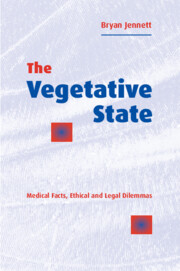Book contents
- Frontmatter
- Contents
- Foreword
- Preface
- Acknowledgements
- An appeal to doctors
- Traumatic decortication
- List of abbreviations
- 1 A syndrome in search of a name
- 2 Diagnosis
- 3 Epidemiology
- 4 Pathology of the brain damage
- 5 Prognosis for recovery and survival
- 6 Attitudes to the permanent vegetative state
- 7 Medical management
- 8 Ethical issues
- 9 Legal issues in the United States
- 10 Legal issues in Britain
- 11 Legal issues in other countries
- 12 Details of some landmark cases
- Epilogue
- Index
11 - Legal issues in other countries
Published online by Cambridge University Press: 21 December 2009
- Frontmatter
- Contents
- Foreword
- Preface
- Acknowledgements
- An appeal to doctors
- Traumatic decortication
- List of abbreviations
- 1 A syndrome in search of a name
- 2 Diagnosis
- 3 Epidemiology
- 4 Pathology of the brain damage
- 5 Prognosis for recovery and survival
- 6 Attitudes to the permanent vegetative state
- 7 Medical management
- 8 Ethical issues
- 9 Legal issues in the United States
- 10 Legal issues in Britain
- 11 Legal issues in other countries
- 12 Details of some landmark cases
- Epilogue
- Index
Summary
South Africa
The case of Clarke was decided in July 1992 (1) and was referred to a few months later by more than one judge in the Bland courts in England. This 68-year-old doctor had been in a vegetative state for 4 years since a cardiac arrest and had a living will (details p. 204). His wife and family applied to the court to appoint her as curatrix personae with powers to discontinue nasogastric feeding. The court-appointed curator ad litem did not oppose the application but the Attorney General for the Province did. The judge ruled that there was no reason why a curator should not have power to give effect to the valid prior direction of the patient to be allowed to die. He quoted Quinlan and Re J and Re B in support of his decision to grant the application.
New Zealand
The case of L was decided in August 1992 (2) and, although not a classical vegetative state due to brain damage, it was extensively quoted by the Bland judges later that year, and by judges in other jurisdictions since. He was a 59-year-old man with severe Guillain–Barre syndrome which affected the peripheral nerves and gradually paralysed all the muscles in his body (details p. 206). For the last year he had been dependent on a ventilator and unable to interact in any way with his surroundings and displayed no awareness.
- Type
- Chapter
- Information
- The Vegetative StateMedical Facts, Ethical and Legal Dilemmas, pp. 173 - 186Publisher: Cambridge University PressPrint publication year: 2002

